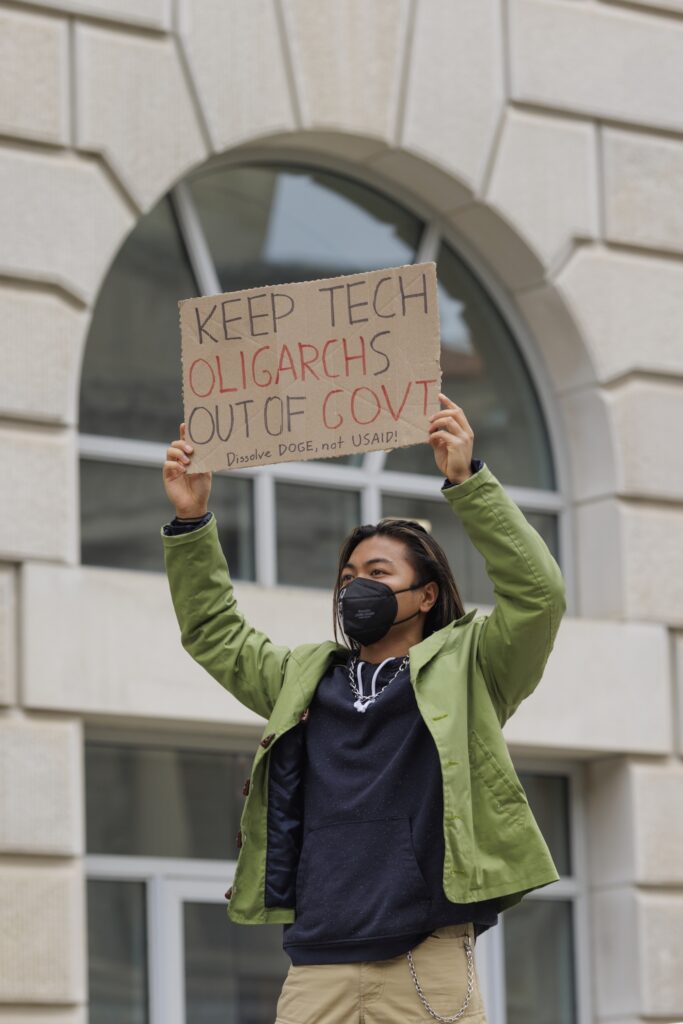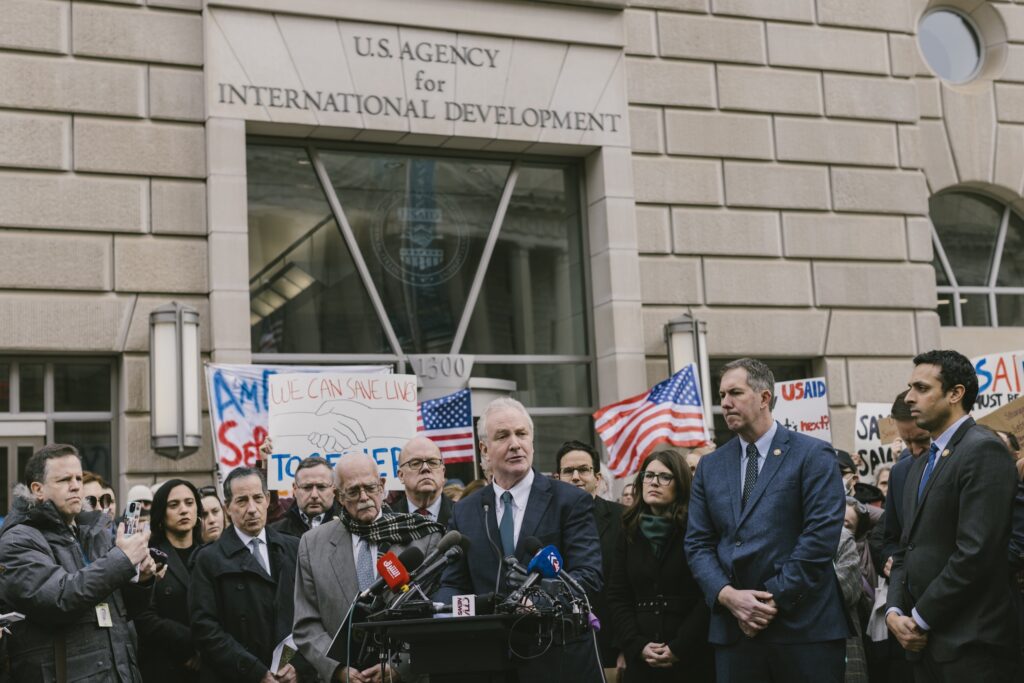This week, three of several Greenbelt residents who work for the U.S. Agency for International Development (USAID) agreed to speak with the News Review about their experiences as Elon Musk attempts to dismantle the agency they work for. All USAID employees we reached out to feared reprisal and we are using aliases to protect their identities.
David (not his real name) lives in Greenbelt and has worked for USAID for 15 years. He works in the Bureau of Humanitarian Assistance (BHA). “We’re like FEMA for the rest of the world,” he explained. “So whenever there’s a natural disaster or a conflict or a humanitarian crisis outside of the United States we respond to them.” USAID has direct hires, civil servants and institutional services contractors (ISCs) who work for a company but are embedded in USAID. There are also personal services contractors (PSCs) who have a direct contract with the government and act like an individual company, explains David. He’s in the latter category.
Melissa (not her real name) is a federal employee at
USAID, which she joined in 2013. She described her role as working in compliance.
Greenbelter Stephanie (not her real name) has worked for
USAID for over a decade. She preferred not to share the area in which she works.
Week of January 20
Like other federal workers with whom we talked, Melissa describes a series of strange emails claiming to be from the Office of Personnel Management (OPM). Melissa said the emails came from opm.gov addresses that didn’t make sense. One email instructed recipients to trust emails from that address. Metadata also shows the
messages are coming from outside of the government, says Melissa. She believes they are coming from a server installed by a non-OPM group, employees of Musk, some of whom have been given positions with the Department of Government Efficiency (DOGE). “It’s a coup! Legitimately, that’s what it is. The government is not being run by the government right now. It’s being run by associates of Elon Musk. I don’t think it’s an exaggeration to say that elected officials are not in charge, they’re not the ones making the decisions and the ones implementing them are not the civil service,” she says.
Immediately following the inauguration, USAID employees received a directive email informing them that Diversity, Equity, Inclusion and Accessibility (DEIA) programs were being discontinued and their DEIA colleagues had been put on administrative leave. They were also told to report any DEIA programs or workers attempting to hide their work under different names. The email was signed by someone they later found out was their new acting administrator, David reported. Melissa said she spent the week removing keywords from documents, to a point of absurdity where phrases such as “diversity of opinion” were being flagged. The impact of this is huge she said, since the federal government is seen as a leader, and industry across the country looks to it and follows suit.
Melissa said she was instructed to close programs relating to DEIA by day two, something that wasn’t possible. “You can’t just shut it off. There’s a whole process you have to go through to close out an award. … at the same time they’re shutting off all the spigots to make sure no funding goes out – funding doesn’t go out this time of year anyway; we have a funding cycle,” she said. The “spigots” being shut off are the same ones that are needed to close things out, she explained, describing a bottleneck in the agency’s awards. It’s “un-implementable,” she said. “It’s not possible to get things out the door and at the same time we’re still dealing with the whole ‘you can’t send emails.’ They all have to go through the head of the agency. … It’s absurd. It’s bizarre.”
There’s been an outcry over funding freezes for domestic grants and foreign aid and subsequent announcements of exceptions and waivers, Melissa notes. “Word like that has gone out but those spigots I was talking about still have not been opened so no funding is going out for the things they’ve announced. … It’s just PR lies,” she says.
Week of January 27
On Monday, January 27, David was in morning meetings when an ISC he works with started receiving emails telling them to stop working and go home. “About 700 of those people, a week ago Monday, were sent home,” he told the News Review. The rest of the workers, including civil servants and PSCs, like David, were left there, thinking, “Okay? We just lost about a third of our workforce,” he said.

Melissa confirmed, saying, “Last week we were told to shut down all the institutional contracts, which is about a third of the USAID workforce.”
David says one of the things those who remained started to do was to communicate with each other outside of work, something they didn’t regularly do before. On the night of Sunday, February 2, somebody commented to David that they were unable to get into their USAID account. When he checked he found he couldn’t get into his email, either. “So, they were just shutting down our emails Sunday night,” he said. “They were shutting down the PSCs by turning off their emails. There was no communication. There was no, ‘Hey we’ve decided we’re gonna put you all on administrative leave.’ … I still don’t know what’s going on. I just know I don’t have an email,” he said Monday. His contract is for one year and is renewable four times, a way of giving a five-year contract that’s reviewable annually, he explained. There is a clause that allows for the government to cancel the contract with 15 days’ notice. “But they haven’t done that,” he notes. “We haven’t heard anything. I still don’t know what’s going on except what I hear on the outside,” says David. “No one’s communicated to us anything. … But I do have a contract that’s signed by a U.S. government contracting officer,” he says. David said his supervisors said they didn’t know anything.
On Friday, January 31, DOGE and Musk employees had arrived at the USAID headquarters in Washington, D.C. and tried to gain access to classified areas, the Sensitive Compartmented Information Facility (SCIF). Security personnel who attempted to stop them were placed on administrative leave. By Saturday, the group had gained access to the SCIFs. On Sunday, February 2, Musk, now head of DOGE, announced on X, “USAID is a criminal organization. Time for it to die.” Later, on the same platform, he gloated, “We spent the weekend feeding USAID into the wood chipper. Could gone to some great parties [sic]. Did that instead.”
Week of February 3
Speaking with the News Review on Monday, Melissa said of the PSCs, “They’ve all been locked out. But no one knows who locked them out. The people who have the authority to do that have not been notified.” Alarmingly, many of those overseas are PSCs, she noted. She had to fill out information about the PSCs in her unit but wasn’t told what it was for, though “we didn’t imagine anything good was going to happen,” she said. “We’re duty bound to follow due process. We wouldn’t just strand people. I don’t know any civil servant who would do that. We all take this very seriously. And if we’re comfortable disregarding the law then we’re not fit for the position.” Yet they’ve been given instruction that Executive Orders are to supersede law and policy where they conflict, “which is egregious,” she says. “We’re demonstrating contempt for the law, which is appalling. That’s not the way any civil servant I’ve ever worked with behaves. That’s insane.” Their general counsel and ethics lawyers have been put on leave, she says. “All the means of recourse are being shut down,” she says.
Up until Thursday of last week Stephanie thought they were preparing for a 90-day review of the agency. Since then, things have been unpredictable, though it makes sense they’d fire the ethics lawyers first, she said. On Monday she arrived at her office, which is not in the headquarters, around 7:30 a.m. A little later she and a couple of colleagues already there started to get messages from other colleagues that they weren’t being let in. They prepared themselves for being removed. But instead, the colleagues downstairs were let in and she stayed in the building the whole day. On Tuesday she participated in a union meeting. She was encouraged to know people were trying to help them. “We just want to do our work. We’re all so mission driven. We believe in it,” she said. “This does not make America safer, stronger or more prosperous. It’s risky for all those things.” This week it’s heartening to see people start to speak out and pay attention, she said Tuesday. “There’s not a lot of trust being built. We think of ourselves as the good guys,” she told the News Review.
What’s Next?
Those who spoke to the News Review expressed concern for their colleagues abroad. BHA has people in Washington, D.C. managing responses, David said, but also people abroad in Thailand, Ukraine, Kenya and Israel. “It’s putting people in harm’s way. … These people who are out there doing their job one day wake up and they’re no longer being supported by their organization. They’re not sure how they’re going to get home,” David said, noting some were posted overseas with their families. “People were saying, ‘I don’t know how me and my children are going to get back.’ Because nobody’s communicating. It’s all just, ‘Shut it all down.’ It’s really one of the most incredibly stupid things I’ve seen in my entire life,” he said. “It’s like it’s not thought out. It’s just this guy [Musk].”
Melissa says there are USAID workers in Ukraine cut off from their USAID access now: “No one will answer their calls, they don’t have access to their email, they don’t know how they’re getting home, they’re stranded in a war zone.” The same is true of people involved in evacuations from the Congo due to Ebola. “And that’s an accompanied post so there are people with school-aged children,” she notes, “whose access has been terminated in the middle of an evacuation. So they’re stranded … in Brazzaville, so not even in their homes. I don’t know how they’re paying for accommodations. We’re taking away their government resources and not flying them back home. It’s in everybody’s contract. You can’t strand somebody like that but nobody’s getting any responses,” she said.
Melissa also said shutting down USAID is costing lives and dismantling systems that can’t easily be brought back. She gave the example of the program FEWSNet, a famine early warning system: “There’s not been a significant famine in any country where it reports data. And it’s gone, we’re not funding it anymore, just on a whim and it saves probably millions of lives. Every year it saves lives.” Tracking of diseases will be impacted, too. One of the people they just froze as a PSC was the deputy in charge of the Ebola response that’s ongoing right now, she says. “There’s going to be a lot of hardship as a result.
“It creates gaps. … China is actively trying to move into this space and we’re creating a huge vacuum and opportunity for that. And [stopping] a lot of the work we do in Eastern Europe or Central Asia, that’s creating opportunities for Russia, as well. … There are places where we’ve been actively competing with Iran,” says Melissa. “You know, USAID is a national security agency and that’s not just for show. The work that we do makes America more safe and when we pull out, it creates more unstable environments there. Are we going to wind up needing to send military in at some point?” she asks. “We’re a cheap option for security. … This is less than one percent of the U.S. budget and we have a huge impact.”
In the fall David was in Israel working on the Gaza response. “Talk about walking away from people in need,” he said Monday. He also worried about the ripple effect on nongovernmental organizations who won’t be able to pay employees, including some who live in Greenbelt, without USAID support. David, Melissa and Stephanie all believe dismantling USAID is a test case. “I’m sorry for the United States,” says David, “because if they’re doing this to us today, you know, NASA’s going to be next. … I think it’s just starting.”
Melissa also worries about the information being handed over to a private citizen, “a private citizen with known strong ties to China and Russia,” she notes. “There’s already been irreparable damage done,” she says of the information and data in Musk’s hands.

Personal Outlook
David says he’ll be okay. He was paid on the weekend, but there’s a week lag, so he’s completed a week into his next pay period and he’s still working, without email, because he hasn’t been told not to. He has over 220 hours of accrued vacation time. “I’m not crossing my fingers. … I’ve been shut out of the time and attendance system,” he said.
Melissa, a single mother, is the sole provider for her infant, who also relies on her health insurance. “I assume I’m going to be let go. I don’t know when. We’re not expecting to get notice, and we’re not expecting due process to be followed. I’m pretty worried about that,” she said Monday night. Early that morning she received a text message that personnel should remain off site unless individually contacted by senior leadership. The messages don’t sound like federal communication, with different tone and language, she said. “I’m hoping that we’ll get some congressional action to stop some of this or at least slow it down,” she said Monday, noting Democratic members of Congress were at a press conference outside the USAID headquarters that day but were denied access to the federal building.
On Tuesday evening, Stephanie was placed on administrative leave. She received an email along with everyone else from her D.C. office. They were then locked out of USAID systems.
Hours later, Melissa received an email from internalcomms@subscribe.usaid.gov. “On Friday, February 7, 2025, at 11:59 p.m. (EST) all direct hire personnel will be placed on administrative leave globally, with the exception of designated personnel responsible for mission-critical functions, core leadership and specially designated programs,” it read. Essential personnel expected to continue working would be informed by 3 p.m. on Thursday, February 6, it stated. For those posted abroad, the Department of State is preparing a plan “with all applicable requirements and laws” to arrange and pay for return travel within 30 days and “provide for the termination of PSC and ISC contracts that are not determined to be essential,” it continued. Exceptions would be considered on a case-by-case basis, said the email. “Thank you for your service,” it concluded. It was unsigned.



